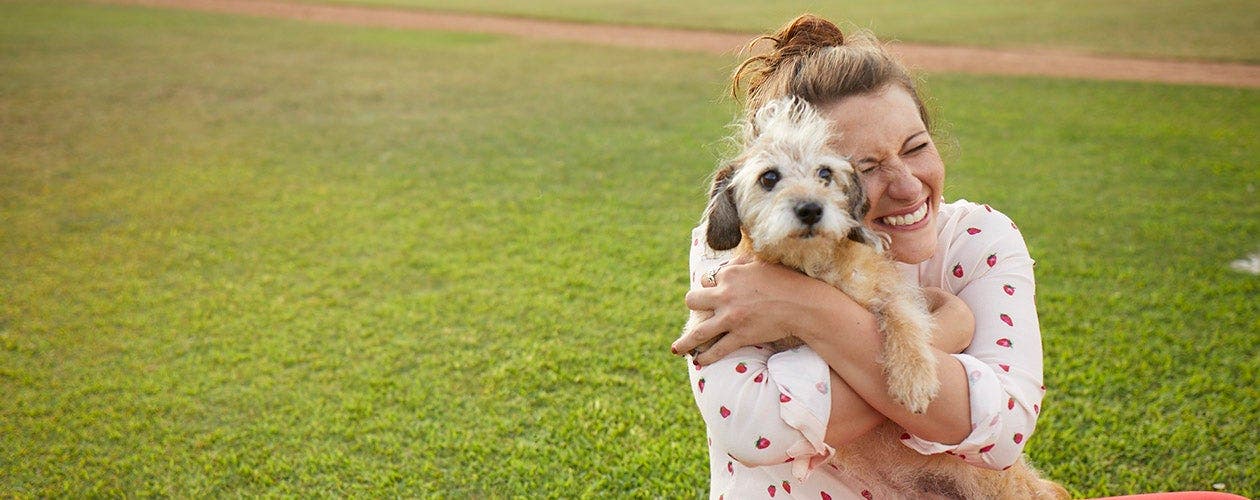9 science-backed ways to be happier


Being happy doesn’t always come down to big actions and grand gestures – sometimes it’s the smaller things that can make you feel a whole lot better.
Here are 9 little things you can start doing right now to be happier. And they’re all backed by science, too!
1. Sit straight and stand tall
In a study by Dutch scientist Erik Peper, participants found it easier to think positive thoughts or summon up positive memories when they made a conscious effort to sit up straight or walk without slumping their shoulders.1
2. Play with your pets
According to collaborative research between the National Marine Aquarium, Plymouth University and the University of Exeter, spending just five minutes interacting with your pet can release endorphins and other ‘feel-good’ hormones into the brain. Fun fact: watching fish swimming in a tank can reduce blood pressure by 4%!2
SUCCESS STORY: Find out how Dannielle’s dogs helped her lose 5st
3. Crank up the volume
Many of us listen to music to relax, but our favourite tunes may affect us more than we think. Research by Stanford University indicates that slow beats encourage slow brainwaves typically associated with hypnotic or meditative states.3 British band Marconi Union even worked with sound therapists to create what scientists have described as the “perfect relaxing song”. Weightless has been proven to slow heart rate, reduce blood pressure and lower levels of stress hormone cortisol.4
4. Help others
Doing good makes you feel good! A 2017 study found that people feel happier after an act of generosity, because activity in the brain regions involved in helping others appears to override activity in the regions connected with personal reward.5
5. Eat yellow foods
According to a study by the Happy Egg Company, eating yellow foods like bananas and eggs can contribute to feelings of happiness because we associate this colour with joy. Apparently, red foods are our second favourite and brown foods take third place.6
RELATED: What’s the truth behind mood boosting foods?
6. Say hello to JOMO
Sometimes not doing something can make you happier too. FOMO (the fear of missing out) is slowly being replaced by JOMO (the joy of missing out). Not being afraid to say no to invitations, and enjoying some 'me time' instead, can do wonders for your wellbeing. For example, taking a few minutes to simply sit still and focus on your breath can promote physical relaxation and even lower blood pressure.7
7. Be grateful
Research by UC Davis psychologist Robert Emmons found that the simple act of keeping a gratitude journal, and regularly noting down brief reflections on what we’re thankful for, can substantially increase wellbeing and life satisfaction.8
8. Book a weekend by the sea
The restorative effects of water are widely known anecdotally, and now the science backs it up. A study conducted in Wellington, New Zealand found that higher levels of ‘blue space’ (bodies of water) were associated with lower psychological distress.9 A recent UK-based study also found that individuals living near the coast were generally happier and healthier than those living inland.10 Can’t make it to the beach? Try going for a swim instead, and treat your mind and body to the calming effect of water.
9. Book a holiday
A study published in Applied Research in Quality of Life found that holidaymakers experienced a higher degree of pre-trip happiness compared to non-vacationers, which was attributed to the anticipation of a holiday.11 It doesn’t have to be abroad, but if you think a dose of the sun-drenched Mediterranean would do you some good.
1. Research by Erik Peper, Psychology Professor at San Francisco State University
2. Research conducted at Stanford's Center for Computer Research in Music and Acoustics
3. Various sources, published in the Telegraph
4. Study published in Nature Communications
5. Research by the Happy Egg Company
6. Study published by the National Center for Complementary and Integrative Health
7. Research by Robert A. Emmons, Ph.D., a leading scientific expert on gratitude
8. Research published in Health & Place journal
9. Study published in the Journal of the Marine Biological Association of the United Kingdom
